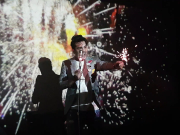By Martin Caballero
Faisal Kapadia may be thousands of miles from Pakistan, but his country is never far from his mind.
Kapadia is one-half of the Karachi-based pop group Strings, which performs Thursday at Berklee Performance Center. Since forming in 1988, Kapadia and partner Bilal Maqsood’s work as ambassadors of Pakistani pop have made Strings one of the Asian subcontinent’s most popular acts. But with Islamic fundamentalism on the rise and the Pakistani government embroiled in a military and political struggle against Taliban insurgents, it’s no time for pop music as escapism.
“If you have a disturbance in any part of the country, the mindset of the whole country changes,” said Kapadia, 38, by phone from Washington, D.C. “People are not in the mood to go out to concerts in Karachi because people are dying. The situation has affected everyone, but especially the entertainment industry within Pakistan.”
Strings started out as a quartet, releasing two successful albums before disbanding in 1992. After an eight-year hiatus, in which Kapadia worked for an advertising firm, he reunited with Maqsood in 2000.
Since then, Strings has released three albums, worked on film soundtracks and picked up numerous honors, including MTV Asia awards for Best Band and Best Album. Without becoming overtly political, Kapadia and Maqsood use their popularity to speak out about social and political issues.
In 2006, they released “Beirut,” a track that used the Israeli bombing of the Lebanese capital city as a springboard to discuss human rights.
“ ‘Beirut’ was really about the whole world, not just the city,” Kapadia said. “The world wasn’t like this 15 or 20 years back. People have lost emotions. We turn on the TV and we see people dying, and after five minutes we just change the channel and go back to our world, which is really sad. We used to feel bad about such things.”
That same year, Kapadia and Maqsood became UNICEF ambassadors for HIV and AIDS awareness in Pakistan, traveling to high-risk areas to speak about prevention and treatment.
“It was never on our agenda to be socially or politically conscious as a band,” Kapadia said. “But when you see that there is some kind of power you have as a musician, it becomes very important to respond, because we have a responsibility to give back to society.”
Not surprisingly, Kapadia counts Bono and U2 as his biggest influence.
After completing this U.S. tour, which includes several charity concerts for the Shaukat Khanum cancer hospital in Lahore, Pakistan, Strings will turn their attention back home. Along with other Pakistani artists, Kapadia and Maqsood are organizing a fund-raiser concert to assist Pakistanis who have been displaced by the fighting with the Taliban.
“The current situation in Pakistan is very disturbing and very depressing,” Kapadia said. “We hope it goes back to normal soon. Whatever we can contribute to help the situation, we would love to.”
Strings, at Berklee Performance Center, Thursday. Tickets: $25-$100; 617-747-2261
Original Source : BostonHerald.com



































